Inappropriate Use of Social Media in Healthcare
Unfortunately, not everyone follows suitable behavior on social media platforms. This could be at work, online when communicating with patients, or even on personal accounts outside of the workplace. Here are situations of inappropriate use of social media in healthcare that your practice needs to avoid.

One-quarter of physicians use social media daily or multiple times a day.
If you don’t already know the benefits of using these platforms as a health provider, it’s important to consider how they can help your practice.
While social channels have benefits, they’re only helpful if you use them correctly. Healthcare is such a sensitive industry with all of the confidential information and unwell patients. Maintaining trust is key to getting people to visit your practice.
But depending on how you conduct yourself on social media, it’s possible to lose some of this trust from patients, staff, or both. Unfortunately, not everyone follows suitable behavior on these platforms. This could be at work, online when communicating with patients, or even on personal accounts outside of the workplace.
Here are situations of inappropriate use of social media in healthcare that your practice needs to avoid.
Distractions
It isn’t unlikely for health professionals to use their devices and social networking while at work.
In hospitals specifically, 78.1% of registered nurses use a personal device at work. A study looked at if they used their devices always, often, or sometimes at work. 38.5% said that they would use it for calling or checking/sending emails and texts. 20.8% said they used it for checking or posting on social networks.
If you have a smart device, you know how difficult it can be to put it away for a while. For some, it’s an addiction. We have such a psychological connection to our phones that we imagine notification vibrations even if they didn’t vibrate.
This makes it hard to focus when we just want to check our phones. But work isn’t the time or place for it, especially in healthcare when patients need attention. It’s even harder for health workers to focus since they work long shifts, meaning more time without checking their devices.
As a result, using social media at work causes distractions.
Employees even acknowledge this. Researchers asked participants to respond to questions regarding their concentration at work. An increase in social media use correlated with more distractions and poorer job performance.
Another study found that 70% of respondents thought access to these channels while at work either currently is or would be a distraction. Only 19% thought that it would improve their efficiency. Most agreed that social media in the workplace should strictly be for educational purposes.

When doctors and nurses have distractions, it’s harder for them to be attentive to their patients. But it’s so necessary that they stay focused when lives are on the line so that they don’t make a mistake. Unfortunately, nurse distractions and interruptions contribute to up to half of medication errors.
Pictures or Videos of Patients
This should be a no-brainer, but somehow it still happens.
If you work in healthcare, you should already be familiar with HIPAA and all of the rules that come with it. One of these is that you need authorized consent for any pictures or videos of patients, especially if you plan on posting them.
Maybe you think that posting these in a private group or sending it to just one person is acceptable. Who would find out? Well, you never know who others will send it to. Or even worse, your account could get hacked and your messages leaked.
Despite how obvious it seems that you shouldn’t take or post images and videos of these vulnerable people, health professionals still do it.
This breaks privacy, hurts hospital reputation, and costs employees their jobs. In one situation, it cost a nursing student her education. The student, Emily, took a photo of her pediatric leukemia patient and posted it on Facebook. People recognized him from the hospital and could identify the facility where he was receiving treatment.
Emily’s school expelled her from the nursing program. After this incident, the hospital barred the school’s nursing program from using the pediatric unit. And now it had to deal with a violation of one of its client’s privacy.
Subtle Pictures or Videos
Okay, so maybe you already knew how bad it would be to take a photo or video of a patient and post it without proper consent. But you also need to be careful about any subtle details that end up in visual content.
In a health facility, you’re surrounded by sensitive information. A document laying on a desk or unlocked computer in the background of a picture or video could display PHI. Or even worse, maybe a patient is in the background as you snapped the image.

Let’s use this stock photo as an example. If a practice posted this on their page and it was a real image, they could end up getting sued. While the focus is on the two doctors in the front, there’s still a patient behind them. It looks like the x-ray was possibly meant to cover her identity, but half of her face is visible. And it also includes an x-ray which is the individual's protected health information.
Even though these are unintentional, it’s still an inappropriate use of social media. Any visual content containing PHI or patient identifiers can lead to a violation.
Sharing Stories
Once you’re away from work, you might want to share a crazy story about your day with your followers (like if a celebrity checked in). Visuals aren’t the only discrepancy with what you share. Stories of clients are also inappropriate to post.
They don’t even need to mention the person’s name for them to violate privacy. Any clues that someone could use to identify who you’re talking about are unacceptable. Maybe it doesn’t seem like an identifier to you, but if someone knows that patient they may recognize who you’re referring to.
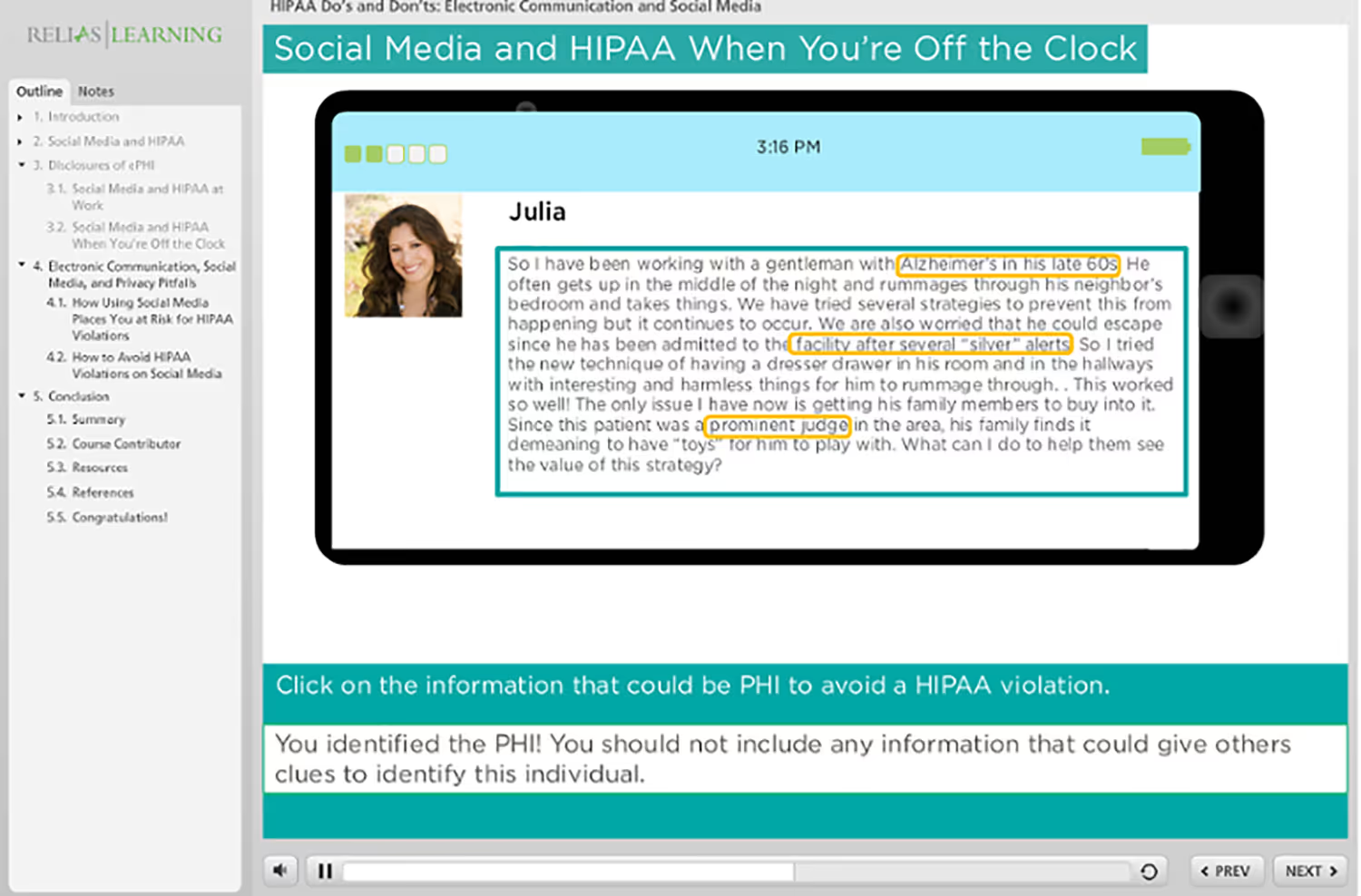
While you might have interesting experiences or want to inform others about what you dealt with, it’s best to not share any stories. They’ve led to HIPAA violations. It also makes others less likely to trust a practice when they see staff posting stories of someone’s health.
Complaining and Negative Comments
This goes along with stories about clients. You should never rant about someone online. Again, it violates their privacy, but it’s just a bad look for your practice. People will be hesitant to receive healthcare from a facility that criticizes their clients online where anyone can see.
Anything that refers to someone in a degrading or demeaning manner is inappropriate. When it gives your company a bad reputation, your employer will lose faith in you. Depending on the social media policy, it might also violate the practice’s standards and lead to job loss.
Complaining and making negative comments about your company is just as unprofessional.
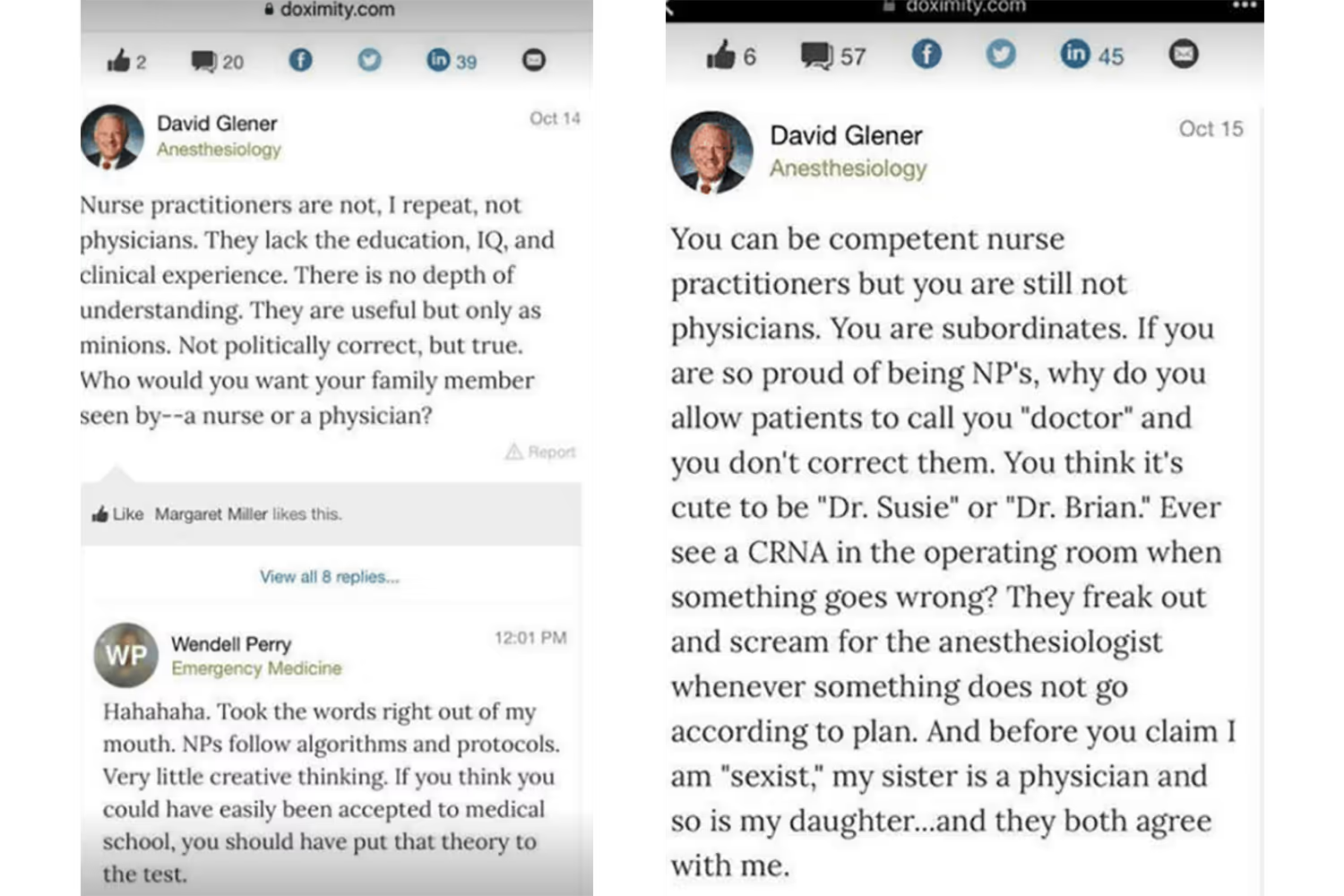
Sure, it doesn’t violate a client’s privacy so it isn’t illegal. But it still worsens the reputation for you and the practice. Your coworkers and boss will have a lack of trust if you show disrespect for the organization. And people will still avoid getting care if they know the staff has a bad attitude toward your company and coworkers.
Offensive Statements
This is similar to complaints because they also have a negative connotation. But it’s a little different in that these statements don’t need to be referring to patients or the workplace.
That’s right: offensive statements unrelated to healthcare are inappropriate to use on social media. It doesn’t seem harmful if it’s on your personal account and has nothing to do with your job. But it can still hurt your reputation as a professional.
The way you act within personal conversations on social media can reflect how you would act in a professional setting. At least that’s how clients and employers see it. Offensive language, degrading comments, and inappropriate conversations that you share publicly cause distrust.
Companies would be less likely to hire someone who posts these things. Yes, employers look up prospective employees before hiring them. A Microsoft survey found that 79% view online information regarding candidates. But only 7% of the candidates were aware that this was a possibility.
If an employer found offensive content on the job candidate’s profile, they’ll doubt that this person would be professional in a health setting. They won’t want to risk hiring someone that might offend and drive away clients. Likewise, if the person already works for them, they’ll lose faith that the person is a trustworthy professional.
Discussing Private Health Information
As I’ve mentioned, posting protected health information without consent is always unacceptable.
But what if someone comes to you with a concern? They must be permitting you to discuss their condition with them if they’re asking you a question.
But even discussing private health information with the patient can be inappropriate. These platforms aren’t secure, and people don’t always realize the risk of sharing this sensitive information. In fact, they want to connect with their providers through social media.
Connecting with them on these platforms opens up the opportunity for people to overshare. For example, they might send a picture of their health concern. Remember earlier when I mentioned that your account could get hacked and information in private messages leaked? The same thing can happen even if they’re the ones sending you the private information. You can still be liable if your account gets compromised and their details leak.
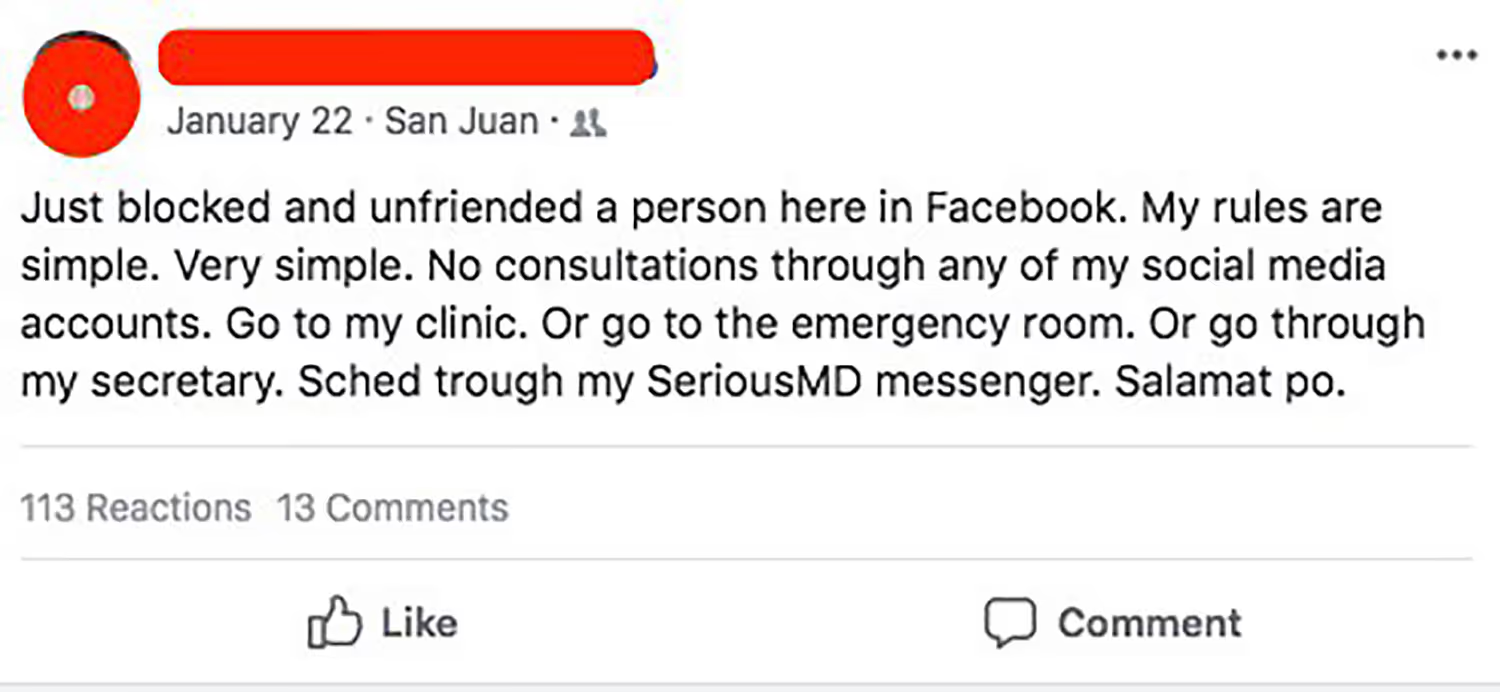
While you’ll want to help as a provider, it’s best to handle these concerns in the office or with a telehealth platform. Encourage patients not to send private data through social channels and to set up a visit instead.
You can’t be diagnosing people online anyway (even though they’re already doing it), especially if you haven’t evaluated them. People will try to get you to do this so they don’t need to set up a visit. But there’s only so much health advice to give based on information collected online.
Even just telling them they need to set up an appointment can help answer their concern. If they messaged you in the first place, they might think there’s a chance they don’t need a visit. But if you encourage them to set up an appointment, they’ll trust that it’s necessary.
Developing Personal Relationships
Your patients aren’t supposed to become your friends.
Of course, you need to have a friendly and welcoming relationship so they can feel comfortable. But the goal isn’t to form a close personal connection.
This can cause boundary issues when it comes to treating them. You don’t want someone to abuse their privilege as your friend to try to get special treatment. It’s best to only maintain a professional relationship on social media.
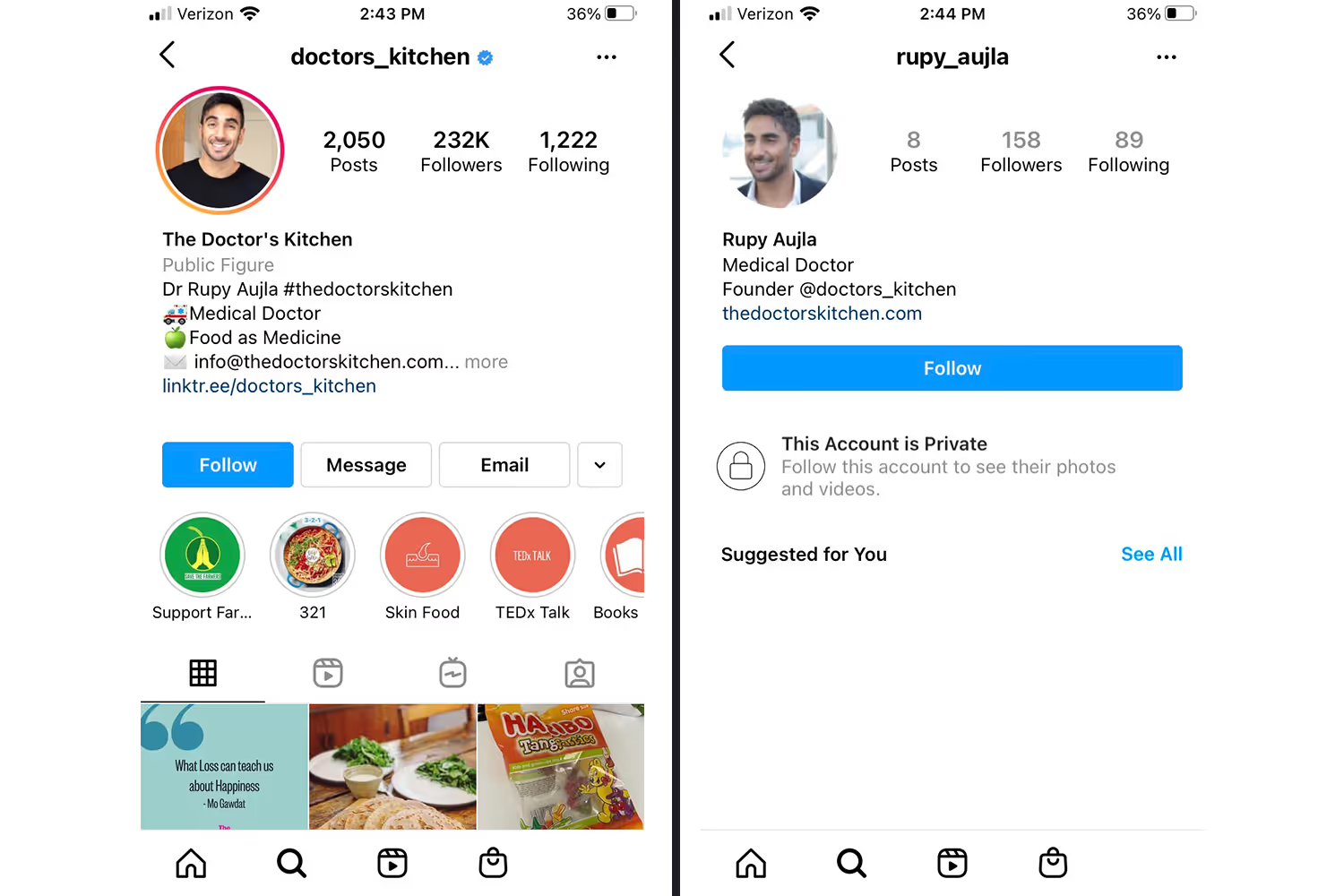
So what does this look like when these platforms are full of others sharing personal experiences? First, it’s best not to follow your patients. Just because they follow you doesn’t mean you need to reciprocate.
It’s also worth separating your social media presence by personal and professional use. This might mean two separate accounts with a private personal page. That way you can separate your private life from your business. You might also decide to use an account for your practice instead of specific to yourself as a doctor.
Keeping these separate helps you distinguish between what’s appropriate to share for your patients to see. That way, there’s no blurriness with the relationship they have with you.
Investigating Patient Choices
One final inappropriate use of social media is investigating patient choices. As I said, you shouldn’t follow your clients on these channels. It’s best not to creep on their profiles either. This is often called “patient-targeting Googling” when you search their online content to use in the clinical setting.
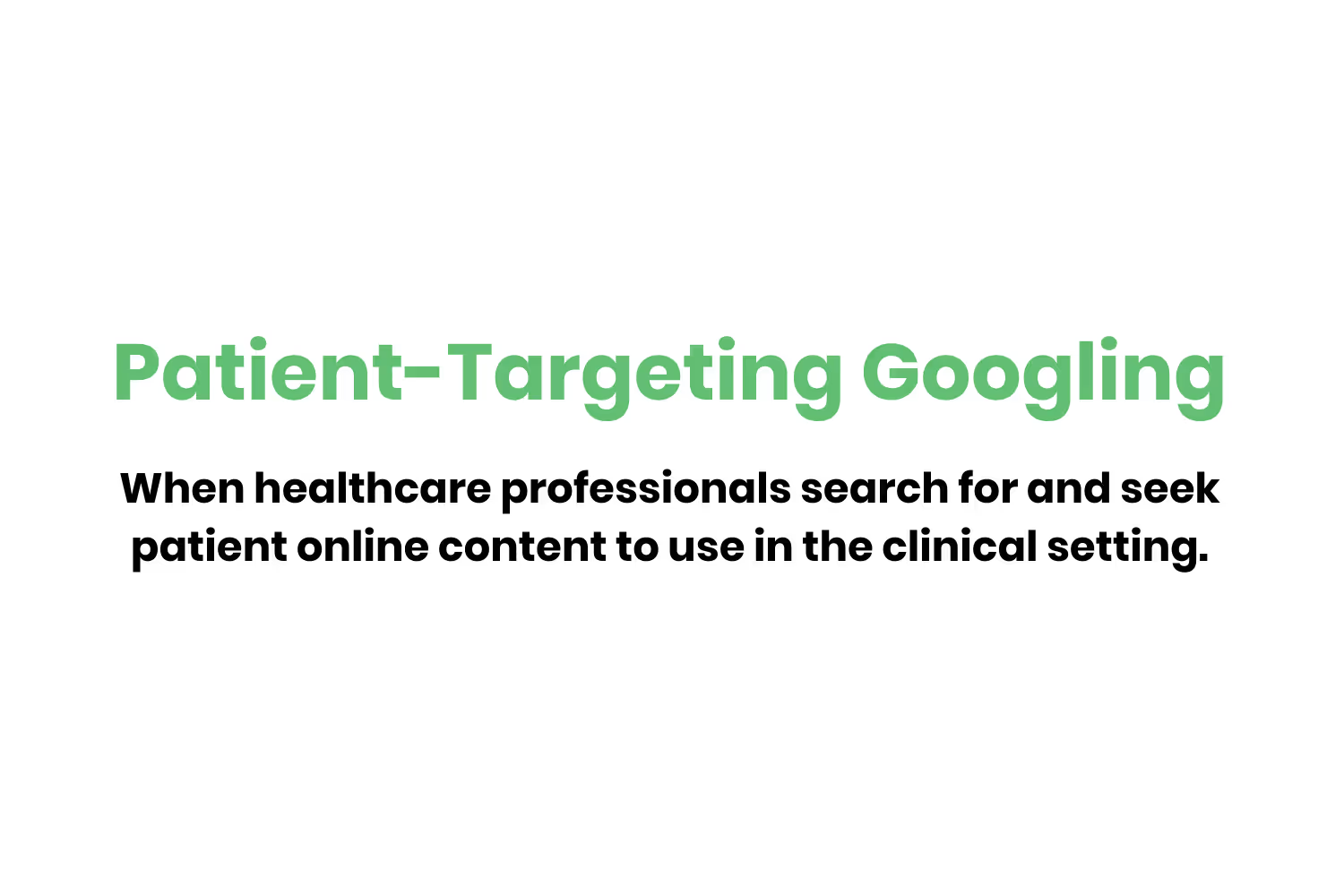
A post you see on their page may depict unhealthy behavior or reckless decisions. While it can be useful to know what outside experience might be impacting their health, this leads to crossing boundaries.
As a doctor, you may feel the need to bring this up in their next visit. You want them to be healthy so you think it’s important to address the concern you saw. But confronting them about something they shared about their personal life that they didn’t feel the need to bring up can be embarrassing. Crossing these boundaries threatens patient trust.
Now, some of the things you saw might be legitimate concerns and you do have the best intentions to help them. But you need to navigate how to reveal these discoveries while remaining sensitive to their feelings and privacy.
Conclusion
Just because social media has positives in healthcare doesn’t mean it’s always beneficial. If health workers don’t use it correctly, it can cause more harm than good.
Distractions from these platforms at work only take away attention from clients. Using it at work to take pictures or videos could even mean HIPAA violations. This causes harm to patients, the practice, and the employee who caused the violation.
But health professionals also have inappropriate use of social media outside of work.
Comments that they share about patients and the workplace can still violate HIPAA or damage company reputation. Depending on how they behave online, people may lose trust in the organization. Comments they make could be so bad that they don’t get hired in the first place.
And when interacting with people online, it’s important to maintain a professional relationship. Sure, social media is less formal. But ultimately, you represent a business and should continue to do so away from the office. If patients need to reach out to you, they should schedule an appointment.
Emphasize your product's unique features or benefits to differentiate it from competitors
In nec dictum adipiscing pharetra enim etiam scelerisque dolor purus ipsum egestas cursus vulputate arcu egestas ut eu sed mollis consectetur mattis pharetra curabitur et maecenas in mattis fames consectetur ipsum quis risus mauris aliquam ornare nisl purus at ipsum nulla accumsan consectetur vestibulum suspendisse aliquam condimentum scelerisque lacinia pellentesque vestibulum condimentum turpis ligula pharetra dictum sapien facilisis sapien at sagittis et cursus congue.
- Pharetra curabitur et maecenas in mattis fames consectetur ipsum quis risus.
- Justo urna nisi auctor consequat consectetur dolor lectus blandit.
- Eget egestas volutpat lacinia vestibulum vitae mattis hendrerit.
- Ornare elit odio tellus orci bibendum dictum id sem congue enim amet diam.
Incorporate statistics or specific numbers to highlight the effectiveness or popularity of your offering
Convallis pellentesque ullamcorper sapien sed tristique fermentum proin amet quam tincidunt feugiat vitae neque quisque odio ut pellentesque ac mauris eget lectus. Pretium arcu turpis lacus sapien sit at eu sapien duis magna nunc nibh nam non ut nibh ultrices ultrices elementum egestas enim nisl sed cursus pellentesque sit dignissim enim euismod sit et convallis sed pelis viverra quam at nisl sit pharetra enim nisl nec vestibulum posuere in volutpat sed blandit neque risus.

Use time-sensitive language to encourage immediate action, such as "Limited Time Offer
Feugiat vitae neque quisque odio ut pellentesque ac mauris eget lectus. Pretium arcu turpis lacus sapien sit at eu sapien duis magna nunc nibh nam non ut nibh ultrices ultrices elementum egestas enim nisl sed cursus pellentesque sit dignissim enim euismod sit et convallis sed pelis viverra quam at nisl sit pharetra enim nisl nec vestibulum posuere in volutpat sed blandit neque risus.
- Pharetra curabitur et maecenas in mattis fames consectetur ipsum quis risus.
- Justo urna nisi auctor consequat consectetur dolor lectus blandit.
- Eget egestas volutpat lacinia vestibulum vitae mattis hendrerit.
- Ornare elit odio tellus orci bibendum dictum id sem congue enim amet diam.
Address customer pain points directly by showing how your product solves their problems
Feugiat vitae neque quisque odio ut pellentesque ac mauris eget lectus. Pretium arcu turpis lacus sapien sit at eu sapien duis magna nunc nibh nam non ut nibh ultrices ultrices elementum egestas enim nisl sed cursus pellentesque sit dignissim enim euismod sit et convallis sed pelis viverra quam at nisl sit pharetra enim nisl nec vestibulum posuere in volutpat sed blandit neque risus.
Vel etiam vel amet aenean eget in habitasse nunc duis tellus sem turpis risus aliquam ac volutpat tellus eu faucibus ullamcorper.
Tailor titles to your ideal customer segment using phrases like "Designed for Busy Professionals
Sed pretium id nibh id sit felis vitae volutpat volutpat adipiscing at sodales neque lectus mi phasellus commodo at elit suspendisse ornare faucibus lectus purus viverra in nec aliquet commodo et sed sed nisi tempor mi pellentesque arcu viverra pretium duis enim vulputate dignissim etiam ultrices vitae neque urna proin nibh diam turpis augue lacus.


.avif)

